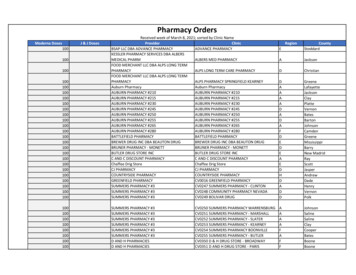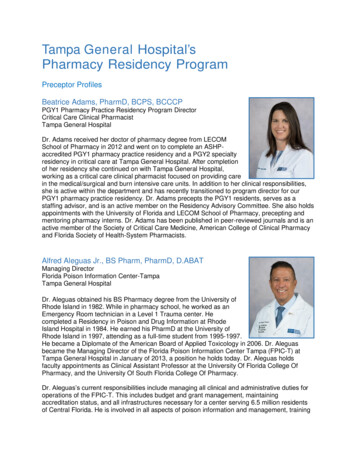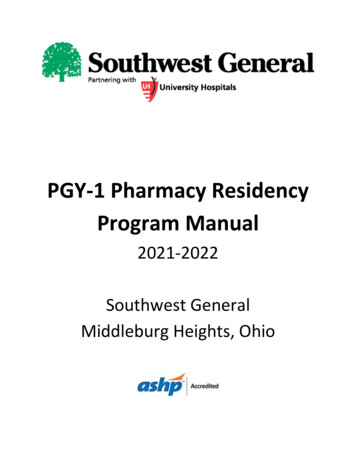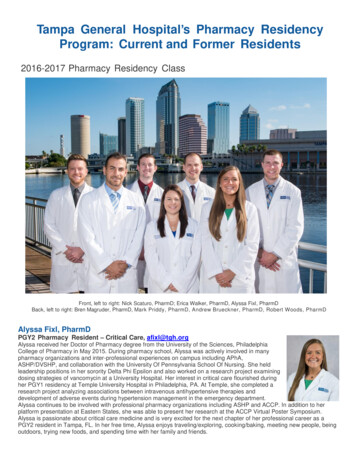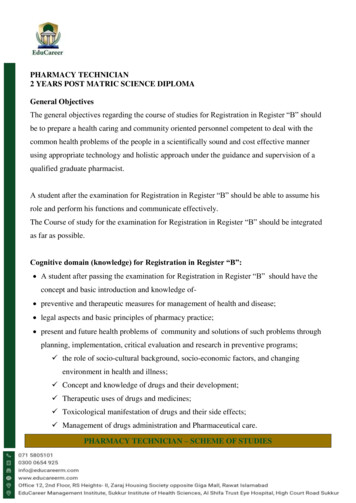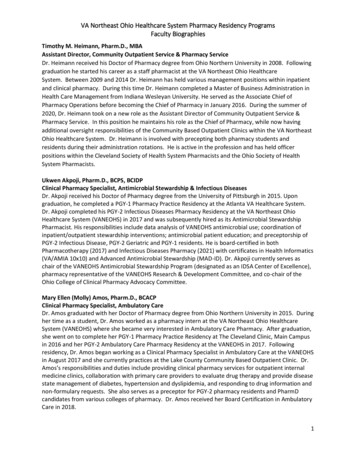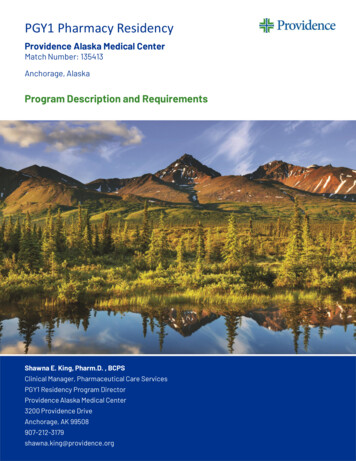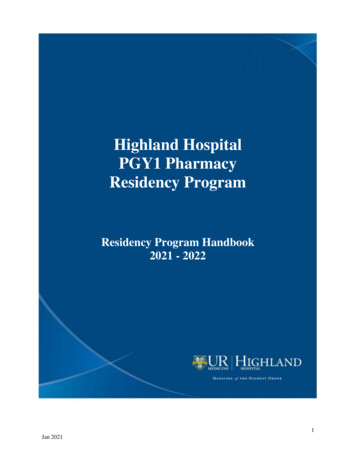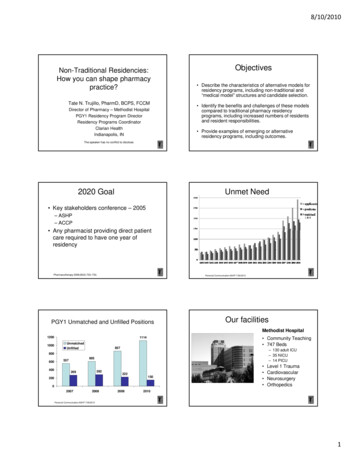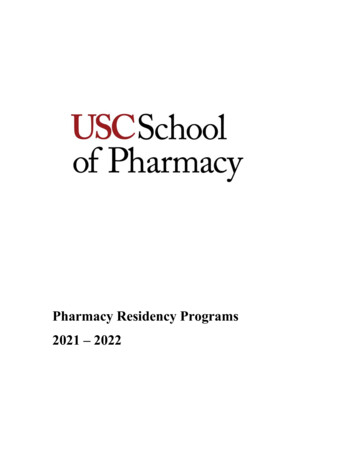
Transcription
Pharmacy Residency Programs2021 – 2022
IntroductionThe pharmacy practice residency programs offered by the University of Southern California inconjunction with the LAC USC Medical Center Health Network, Hollywood Presbyterian Medical Center,Huntington Hospital, Clinicare, Ralph’s Community Pharmacy, USC Campus Pharmacy, USC/NorrisComprehensive Cancer Center and Hospital, Keck Hospital of USC, Veterans Affairs Greater Los AngelesHealthcare System, and various Community/Safety Net Clinics are one-year, postgraduate, non-degreetraining programs. Available PGY1 and PGY2 residency programs are as follows: PGY1 Pharmacy practice with acute care emphasis PGY1 Pharmacy practice with ambulatory care emphasis PGY1 Pharmacy practice with ambulatory care/psychiatric emphasis PGY1 Community Pharmacy PGY2 Ambulatory Care Pharmacy PGY2 Community Pharmacy - Pain Management/Rheumatology PGY2 Infectious Diseases Pharmacy Practice PGY2 Oncology Pharmacy Practice PGY2 Psychiatric Pharmacy PracticeThe residency programs offered through the University of Southern California School of Pharmacyare primarily designed to train and develop advanced skills in pharmacy practice and teaching whileincreasing the resident's knowledge base through direct exposure. Depending on the area and the resident'sfocus, the resident will receive extensive clinical experience in primary, secondary, and tertiary care settings.In the various practice setting rotations the resident will refine their skills and develop expertise as a drugtherapy specialist through the provision of patient care services. Teaching skills of the resident will bedeveloped in both the clinical and classroom settings. A Teaching Certificate program is available forresidents interested in a career in academia or working in settings which involve teaching (e.g., preceptingstudent pharmacists/residents/other healthcare trainees, education of staff). Elective and assigned projects willenable the resident to develop administrative, analytical and research skills.Upon satisfactory completion of the one-year residency as determined by the Checklist forCompletion of Residency Requirements, the participant will receive a Certificate of Completion of aResidency issued by the University of Southern California School of Pharmacy.2
Resident QualificationsAll graduates of an accredited College of Pharmacy who have completed a Doctor of Pharmacydegree who are licensed or are eligible for licensure as a pharmacist in the State of California during theresidency training period may apply. The resident should be comfortable and competent in clinical situations.Criteria for selection to the USC School of Pharmacy residency program include:1.Leadership abilities2.Professional development3.Professional competence4.Communication skills5.Scholastic achievements6.Dependability and ability to work with others.These criteria may be determined through personal interviews, peers, pharmacy school transcripts,evaluations by instructors and supervisors, and letters of recommendation in conjunction with the application.Persons involved in the review process include RPDs, preceptors, faculty, residents, the Associate Director ofResidency Programs, and the Director, Residency and Fellowship Programs. The preceptors and residentsalong with the RPD determine individual program rubric criteria, review and score applications, and interviewcandidates. The RPD is responsible for managing the interview process (including inviting candidates for aninterview) and the final ranking of candidates to be submitted to PhORCAS. The Associate Director ofResidency Programs and the Director, Residency and Fellowship Programs may be included in individualprogram processes as deemed appropriate by the RPD.,A standard procedure is used by the USC Residency Programs to formally evaluate the qualificationsof applicants to the program. The Residency Council meets to determine the minimum requirements (e.g.grade point average) needed for full application review. Individual residency programs may set more stringentminimum requirements through their Residency Advisory Committees. Each residency program uses a pointbased rubric specific to their program for full application review and scoring of each candidate who meets thegeneral residency program minimum requirements. The candidates are then ordered based upon the totalscore. Candidates are invited for an interview based upon their total application score and available residencyslots (typically 6-12 interviews are conducted per residency slot). A point-based rubric system is also used forinterviews involving a large number of candidates and interviewers. Programs with a smaller number of3
interviewers and candidates may opt to rank candidates as a group immediately following the interviews butmust document how the interview ranking was determined. The final ranking resident rankings for eachprogram is determined by one of the following methods: Combination of application and interview score orinterview score/ranking only. The resident rankings for each program are then presented to the ResidencyCouncil for review and approval. As the residents are part of our teaching faculty, the recommendations forappointment of the residents by the Residency Council are presented to the faculty for their review beforebeing forwarded to the Dean’s office for final approval by the USC School of Pharmacy.Verification of the completion of a PGY1 residency for PGY2 residents will be completed within thefirst month of the residency program. The PGY2 resident will need to submit a copy of their PGY1 residencycertificate to the Residency Programs office. A signed letter sent directly to the Residency Programs officefrom the PGY1 RPD confirming successful completion of the PGY1 residency will be accepted in lieu of acertificate if it is not yet available.4
Organization of the Residency ProgramsThe pharmacy residency programs at the USC School of Pharmacy are organized under theDepartment of Clinical Pharmacy. The Director, Residency and Fellowship Programs chairs theResidency Council and is responsible for the overall direction of the residency training programs. TheResidency Council has responsibilities for the following: Develop Long-term Program Goals Evaluation of Residency Programs, Mentors, Preceptors Allocation of Residency Positions Approve Residents’ Teaching ActivitiesThe Residency Council composed of residency program directors (RPDs), resident representatives,Associate Director of Residency Programs, and Director, Residency and Fellowship Programs performactivities such as Propose to the faculty the number of residents with justification, identified mentors, and proposedschedule Planning specific programmatic activities within each residency program consistent with theoverall residency programming Identify mentors for each resident in the respective programs Manage scheduling of rotations and preceptors Coordinate residents’ activities consistent with overall residency programming Recruit, interview, recommend list of acceptable residency applicants to faculty5
Resident Class Leadership OpportunitiesResident RepresentativeThe residents will select two Resident Representatives from their group by majority vote. Oneresident is selected to represent the USC-paid residents and the other is selected to represent the residents ofaffiliated residency programs in the VA Greater Los Angeles Health System, Huntington Hospital, HollywoodPresbyterian Medical Center, etc. The Resident Representatives may serve the entire year or may make achange in January so that others may have an opportunity to serve. In addition, the Resident Representativesmay be replaced if the majority of the residents deem it necessary.The Resident Representatives’ responsibility is to act as leaders for the group, to assist the Director,Residency and Fellowship Programs and Associate Director of Residency Programs, and to communicateinformation to the residents. Their responsibilities include but are not limited to the following:1.2.3.4.Serve as Resident Representatives on the Residency Council.Serve as chair at the residents' meetings.Maintain attendance record of residents at scheduled activities.Remind residents of deadlines, commitments, and events and insure that requested forms andreports are completed and returned by the residents.5. Act as a liaison between the residents and the Director, Residency and Fellowship Programs andAssociate Director of Residency Programs including scheduling and attending quarterly debriefmeetings to represent the residents.6. Coordinate the schedule of the Residency Showcase including the set-up/take down/transport ofshowcase materials.7. Organize Patagonia custom jacket order for residents8. Create a powerpoint presentation for the end of the year banquet9. Introduce residents who are presenting at the weekly case conference reviews10. The Resident Representatives may delegate aspects of their responsibilities with the approval ofthe Director, Residency and Fellowship Programs.Resident Social ChairsThe residents should identify two Social Chairs who will coordinate and plan activities for theresidency class. The intent is to provide some levity and fun activities to encourage participation among theresidents aside from their professional responsibilities during the residency training activities. Some of theseactivities can include outings, or simply activities planned during the residents’ meeting, etc.Resident Wellness Committee (RWC)The residency program can at times be very busy and stressful. The purpose of the RWC is to addressresident well-being during the residency year. The membership of this committee consists of all interested6
residents and is chaired by the Associate Director of Residency Programs. The RWC meets at regularlyscheduled times during the year to discuss issues related to the mental well-being of our residents and takessteps, as necessary, to address issues that may negatively impact resident well-being. The RWC also assists inthe identification of topics related to wellness and/or psychological aspects of caring for patients to be includedas part of the resident teaching seminar each year. The residency programs is represented on the USC School ofPharmacy Project Wellness committee by 1-2 members of the RWC who serve as liaisons. Other leadershippositions may be available through the RWC as needs dictate.Diversity, Equity, and Inclusion (DEI)The residency programs are committed to DEI within, and outside of our programs. The residencyprograms is represented on the USC School of Pharmacy DEI committee by 1-2 residents who serve asliaisons.7
Salary and BenefitsIndividuals accepted to the Pharmacy Residency Programs at the University of SouthernCalifornia School of Pharmacy actively participate in a twelve-month training and teaching programnormally beginning July 1 and ending June 30 of the following year. Upon satisfactory completion of thetwelve-month program, individuals will receive a Residency Certificate-of-Completion.Residents accepted in the program are appointed as non-exempt staff with faculty appointments asAdjunct Clinical Instructor of Pharmacy Practice. Those paid by USC receive a fixed-term contract;those paid by an affiliate job site are appointed voluntary faculty status at USC. The resident will abide bythe applicable University regulations, policies and procedures. Professional liability insurance is providedin the various institutional job sites.Residents salaried at USC are eligible for the following:1. Annual Salary. The annual salary is approximately 59,000. * Staff at USC are paid bimonthly basis. If the 26th of the month is a weekend or University closed holiday, payday is the previousworkday.2. Fringe Benefits. A fringe benefit orientation is provided the first workday in July. Theresident has a period of 60 days from your full-time hire date to enroll in benefits. The 60-day enrollmenteligibility window is strictly enforced. Fringe benefits include health care insurance, voluntary retirementplan, basic and supplemental term life insurance, and various other options.3. Separation & Layoff Pay. No separation or layoff benefits are paid to employees hired underfixed term contracts.4. Continuation of Health Benefits After Termination. After termination of your USCemployment, the resident will be eligible to continue your health benefits for eighteen (18) months viaCOBRA, the Consolidated Omnibus Budget Reconciliation Act. The resident will be charged the full costof benefits plus a 2% administrative fee. There will be no University contribution.5. Vacation Time. Twelve (12) working days per twelve-month contract per year are grantedeach resident for vacation time. Requests for vacation are submitted in writing to the Director, Residency& Fellowship Programs, for approval at least two weeks prior to the requested time off. Vacation requests8
are considered in the order in which the requests are submitted and approved contingent upon sufficientpharmacist coverage of the pharmaceutical services sites and teaching commitments. Job interviews, sitevisits, personal appointments, etc. count as vacation days. Vacation time should be used within the twelvemonth appointment period.6. Professional Leave. Professional leave to attend meetings and/or conventions is arranged onan individual basis. Requests for professional leave are submitted in writing to the Director, Residency &Fellowship Programs, and are approved contingent upon sufficient pharmacist coverage of thepharmaceutical services sites and teaching commitments. Residents are eligible for reimbursement, atminimum, for some expenses related to professional meetings. The amount of funding available for eachresident for the year will be announced at Orientation. Additional leave beyond the assigned activities at theprofessional meetings will count at vacation/personal leave time. These include job interviews, site visits,personal appointments, etc.7. Sick Leave and Family Care and Medical Leave. Sick leave is accrued at the rate of one day permonth for each resident. Residents may not use sick time before it is accrued. Residents are generally noteligible for Family Care and Medical Leave due to the requirement of USC employment for at least 12months by the start of the leave.8. USC Identification. Upon receipt of a USC identification, you are eligible to use the USClibraries, to receive discounts at the USC bookstores, to attend USC cultural events, to submit applicationsfor seasonal tickets to USC athletic events, to apply for membership in the Faculty Center, and to enroll inpharmacy postgraduate education courses at no charge. The resident is also eligible for discounts withvarious national hotel and car rental vendors, and southern California amusement sites. Upon completionof the Pharmacy Residency Program and/or termination of employment, the residents agree to surrender theUniversity ID card to the School of Pharmacy.9. Drug Testing. Drug testing is not required by USC but may be required by individual clinicalsites. The resident will be informed by the RPD at the time of assignment to the clinical site if drug testingis required.9
Goals and ObjectivesThe overall goals of the pharmacy residency programs of the University of Southern CaliforniaSchool of Pharmacy are to train a resident to be competent in the provision of pharmaceutical care and to trainthe resident to be competent as an educator. In the process of achieving this, the goals include:1.To develop the resident's understanding and philosophy of pharmaceutical care so that withthis conceptual base they will be able to contribute to the development of the profession.2.To develop the resident's knowledge and appreciation of how other health care professionalsapproach patient care and their responsibilities so they may work with them more effectively.3.To develop the resident's communication skills so they may effectively manage patients byrecognizing their needs and sensitivities.4.To develop the resident's clinical expertise as a drug therapy specialist in their particular areaof interest.5.To develop the resident's teaching skills in both clinical and classroom settings for theeducation of pharmacy students and other health care professionals.6.To provide the resident exposure to various types of pharmacy services and drug deliverysystems.7.To provide the resident with opportunities to work on projects that could involve eitherprogram development or clinical research.8.To develop writing skills and prepare a manuscript for publication. The manuscript is due atthe start of the Western States Conference for Pharmacy Residents, Fellows, and Preceptorsnormally held in May of the residency-training calendar.Activities and ResponsibilitiesThe following resident activities and responsibilities have been developed toward achievement of theaforementioned goals. Specific objectives are identified for each rotation or area of specialization.Resident activities and responsibilities are divided into three primary components. 1) patient care, 2)teaching; and 3) project/research.10
Service Responsibilities (Clinical Practice)The residents will be assigned specific patient care responsibilities on each rotation. The responsibilitiesmay include but are not limited to the following:1.Attend and participate in patient rounds with the health care team.2.Provide drug information and consultation where appropriate.3.Ensure the selection of appropriate drug therapy.4.Ensure accurate distribution and administration of medications including preparation of parenteraldrug products in their respective practice sites at appropriate.5.Provide initial and follow-up patient care using objective and subjective monitoring parameters.6.Provide patient focused care.7.Provide patient counseling and take patient drug histories.Teaching ResponsibilitiesTo Fourth Year Student Pharmacists (P4): The residents are responsible for teaching and forserving as a role model pharmacist to fourth year student pharmacists during their advanced pharmacypractice experiences (APPE). This will involve serving as a preceptor during team-based experiences,small group conferences and one-on-one interaction with the students. Specific responsibilities vary witheach rotation and are outlined in the respective sections of the syllabus dedicated to the various rotations.All residents are also responsible to create Continuing Professional Development (CPD) or ContinuingEducation (CE) materials for the Capstone (Pharmacy Review) course that P4 students take aftercompleting their APPE rotations to assist them in preparing them for the NAPLEX and CPJE. This coursealso provides CE to pharmacists who desire an update in a particular pharmacy topic area or areas and willallow the resident the experience of developing a CE program.To Second- and Third-Year Student Pharmacists (P2, P3): Each resident will be responsiblefor teaching activities associated with the Case Conference Series for P2 or P3 students. Specific teachingresponsibilities include 1) developing teaching materials for the case conferences, 2) facilitating adiscussion group for Case Conference for one (PGY2) or two (PGY1) semesters, to be held weekly duringthe school year, and 3) evaluating the case conference discussions and provide formative feedback tostudents for each weekly case. In addition, the residents will be responsible for serving as a preceptor for11
introductory pharmacy practice experiences (IPPE) for the second- and third-year pharmacy students in theclinical practice settings as appropriate. All PGY2 residents will provide a minimum of one didactic lecturein a therapeutics course related to their specialty area.To First Year Student Pharmacists (P1): Residents assigned to P3 case conference in the springwill also serve as case facilitators for the P1 student pharmacists as part of the Introduction to Therapeuticscourse. Responsibilities of the resident mirror those related to the Case Conference series.To Undergraduate Students Interested in Pursuing a Doctor of Pharmacy Degree:Undergraduate students shadowing pharmacists in clinical practice sites may be assigned to a resident aspart of their learning experience. All PGY1 residents will also provide a minimum of one didactic lecture toundergraduate students who are enrolled in pharmacy-related undergraduate courses.Other Teaching ResponsibilitiesThe resident will have opportunities to provide lectures to pharmacy students and other health careprofessionals during the year as well as facilitate other teaching activities not listed above. Residents mayalso be required to assist with Objective Structured Clinical Examinations (OSCE) and other teachingactivities in the Doctor of Pharmacy curriculum as directed and/or approved by the Associate Director ofResidency Programs. A Residency Program Director (RPD) may require additional teaching activities fortheir program.12
Teaching CertificateThe residents have the option to pursue a Teaching Certificate at the USC School of Pharmacy.Requirements for the Teaching Certificate include the completion of the above teaching activities as well ascompleting other requirements as outlined on the Teaching Certificate Checklist. Residents must receive ascore of meets or exceeds expectations on all items to be considered for a Teaching Certificate at the end ofthe residency year. Please see the separate Teaching Certificate Manual for information related to theTeaching Certificate Program including the Teaching Certificate Checklist. Residents who have an interestin pursuing a career in academia or in participating in teaching activities beyond the basic requirements forthe teaching certificate program have an option to participate in an elective longitudinal academia rotation.Resident ProjectResidents in the various rotations will have opportunities to work on projects which may beadministrative or clinical research in nature. This will afford the residents the opportunity to gainexperience and to develop administrative and research skills. These opportunities are outlined in therespective sections of the syllabus dedicated to the various rotations.The residents should begin to identity projects for the residency beginning July 1 followingmeetings with their residency program directors (RPDs). They will be required to present their projectideas to the faculty and their colleagues at the end of August/beginning of September. Papers forpresentation and/or publication concerning pharmacy services or patients must be cleared through theappropriate pharmacy supervisors and the University of Southern California Health Science InstitutionalReview Board (IRB) for approval as necessary. IRB approval will take time, so it is essential that allresidents submit their IRB applications no later than October 1. Progress reports on the projects will beperformed regularly. It is important that the resident select his/her project early so that it may be preparedin time for presentation in a pharmacy forum such as the Western States Conference for PharmacyResidents, Fellows and Preceptors normally held in the May of the residency calendar. Residents are highlyencouraged to submit Works in Progress abstracts for meetings they are already planning to attend for otherreasons (e.g. residency recruitment) such as the California Society of Health-System Pharmacists (CSHP)Seminar in the fall and/or the American Society of Health-System Pharmacists (ASHP) Midyear ClinicalMeeting in December.13
Manuscript RequirementA manuscript prepared suitable for publication by the end of the residency training program is arequirement. Upon project completion, residents will document their experiences and prepare a manuscriptsuitable for publication. The resident will be required to submit drafts of the manuscript at variousintervals during the residency for review and feedback. The manuscript required may include projectsother than the one presented at the Western States Conference. It may include review articles, case reports,original research, or other topics deemed appropriate by the residency program director. The manuscriptmust be completed and submitted by the start of the Western States Conference for Pharmacy Residents,Fellows, and Preceptors in order for the resident to satisfactorily complete the residency program.Resident EvaluationsResidents will be evaluated using PharmAcademic or the equivalent throughout the year in order tomaintain standards of performance, ensure improvement during the year, and to achieve program goals andobjectives. Evaluations will be performed at regular intervals as determined by the respective residencyprogram directors with both the resident and preceptor discussing and signing off the evaluation at theappropriate intervals. Residents taking consecutive or longitudinal practice experiences in the same practicearea from the same preceptor(s) will be evaluated at a pre-determined interval not to exceed three-months asspecified by the respective program directors. The evaluation will include such items as achievement of thegeneral goals and objectives of the program, and performance of the activities and responsibilities of eachpractice area. Evaluations can be completed electronically and kept in the residents’ portfolio.Evaluations for the Teaching Certificate program/learning experience will be completed by theassigned Resident Teaching Mentor (RTM). Residents must upload all teaching documentation to theirelectronic teaching portofolio on the residency Blackboard site at least one week prior to each quarterlyevaluation to allow adequate time for the RTM to review.Preceptor EvaluationsAt the end of each rotation, the resident is required to complete an evaluation of the learningexperience and preceptor using PharmAcademic. This will aid in designing an experience so that the residentmay benefit maximally from each learning experience. See above section on Resident Evaluations.14
Residency Program End of Year AwardsResident of the Year AwardEach year one resident is selected to receive the Resident of the Year Award. This award is designedto recognize and acknowledge one of our residents for his or her leadership qualities. The resident selectedideally should be an example of a "role model" for other residents to follow.Criteria for the award may include, but are not limited to, qualities such as leadership andcommitment to the profession, not only in teaching but also in service and research. The resident should alsobe someone who has contributed to the overall residency program and is respected among his or hercolleagues. The Resident of the Year candidate is nominated by the residents and selected by the ResidencyAdvisory Committee. The resident selected will be recognized at the Annual Residency and FellowshipBanquet held at the end of the training period.Excellence in Teaching AwardEach year one resident will be selected for the Excellence in Teaching Award by the ResidencyAdvisory Committee based on nominations submitted by faculty, resident preceptors, residents and students.Consideration will include overall contributions to the USC School of Pharmacy programs from faculty.Candidates for the award must have completed the teaching portfolio which are due at the end of May and beeligible for the USC Teaching Certificate.Project of the Year AwardThere will be two Project of the Year awards at the end of the residency year; one for a PGY1resident and one for a PGY2 resident when appropriate. The Project of the Year Awards will be selected bythe Residency Advisory Committee based on nominations submitted by the residents and or by the resident’sfaculty/project advisor. Selection of the Project of the Year Awards includes criteria developed by theResidency Advisory Committee and/or review of poster or platform presentations by the residents. Qualityand completion of the manuscript that meets criteria for publication in a scientific or professional journal willbe considered as part of the selection process.15
Preceptor of the Year AwardThis award complements the Resident of the Year Award. The intent of this award is to recognizeand promote residency preceptors participation, support and interest in our residency programs. All residentpreceptors are eligible for the award. Residency program directors (RPDs) will not be considered for thisaward as they are already recognized for their dedication and commitment to residency training programs byvirtue of being appointed RPDs. The preceptor of the year recipient will be selected by the current residencyclass through a nomination process and to be finalized by May 31. Nominations are to be submitted to theResident Representative or their designate. The Preceptor of the Year selection will be made by the residentsusing criteria developed by them. The selected preceptor should have demonstrated commitment to theresidency program in general as well as to individual residents. Criteria that have been developed by pastresidents may include the following:Criteria1.Be devoted to pharmacy education for all residents, students, peers, and colleagues.2.Devote time to assist residents when needed.3.Be interested in developing the expertise of the resident.4.Be devoted to research for the betterment of pharmacy.5.Possess leadership qualities.6.Be compassionate.7.Be involved with extracurricular pharmacy activities.8.Be responsible.9.Be an expert of their area of specialty.10. Be respected by their colleagues.11. Demonstrate exemplary teaching abilities.12.Be a role model for the residents.16
Teaching Faculty of the YearThis award complements the Excellence in Teaching Award. The intent of this award is to recognizeand promote faculty participation, support, and interest in the teaching certificate program. All facultyinvolved with the te
conjunction with the LAC USC Medical Center Health Network, Hollywood Presbyterian Medical Center, Huntington Hospital, Clinicare, Ralph's Community Pharmacy, USC Campus Pharmacy, USC/Norris . Individuals accepted to the Pharmacy Residency Programs at the University of Southern California School of Pharmacy actively participate in a twelve .
